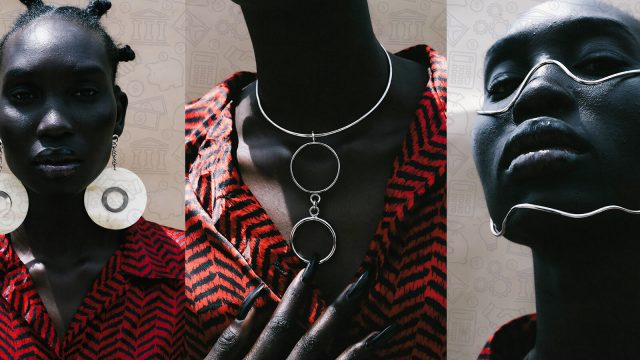Theresia Kyalo on building a jewelry brand
While her work has received an international nod, she serves a niche market for those who appreciate bold, handcrafted jewelry.

Since she started listing businesses owned by Black people on a directory on her website, Beyoncé Knowles has caused excitement amongst owners and entrepreneurs of colour.
Theresia Kyalo was amongst them, her business in a list curated for Beyoncé by the star’s go-to fashion stylist, Zerina Akers, that was revealed mid-2020.
“So this is how I found out,” she says. “Someone tagged me on Instagram. You know how these things go.”
“The good thing about a directory is, and this one, in particular, is, it introduces you to different markets. Many people who look at the directory will see the different businesses there are globally, not only in the United States,” she adds.
Theresia creates handcrafted pieces that combine modern and African styles.
Her pieces all begin with sketches of line drawings, and she experiments with several materials, from paper to different fabrics. After she sketches, an artisan from Kibera fabricates the designs into jewelry.
The recognition by Beyoncé has made her brand stand out locally and internationally and gave it more visibility as well as placing her on a pedestal along with other small businesses from around the world.
“I was able to get different clients from a different market because of that, and it has been helpful,” she says.
Every collection she makes has a story behind it. One of her creations is Kinga Uso which was informed by the pandemic. One of the collection pieces is an ornament that is shaped like a face mask, which is Theresia’s take on what’s going on in the world with the Covid-19 pandemic.
While her work has received an international nod, she serves a niche market for those who appreciate bold, handcrafted jewelry. Some of the collections are wearable everyday pieces, but others are what you might see on a runway or a dramatic art photoshoot.
“My target market is people who appreciate unique things, people who appreciate collectibles because some of my pieces are collectibles. You can buy them and not wear them. And that’s also okay. It’s for people who have an eye for artistic things,” she says.
The average starting point for any of her pieces is KSh5,000.
Most of the pieces are made of brass, which is sourced locally. Theresia prefers to recycle and repurpose the raw material, so she uses leftover scraps from her or other people’s previous projects.
It’s been a fascinating journey for Theresia this far. The exciting thing about what she does is she can choose different mediums to express herself and do her work as she feels.
She will draw when she’s not sketching; if she doesn’t feel like drawing, she will work on a short concept for a short film or a video. But in the end, they will all lead to bold collections that are either neck, ear, face, and headpieces or art in the form of visual illustrations.
Her journey to jewelry design began in a world far from art. Theresia holds a Law degree from Riara University. Art came into the picture when she was still studying for her Law degree at Riara University, and the desire to pursue a career in Law would soon fall by the wayside. Her parents were supportive of her career choice and are proud to see the growth she has achieved this far.
“My parents are very supportive. I think they’re very fascinated with my journey. They’re interested in seeing me grow and have my growth be organic and holistic and not pushed by them, and they’re very open-minded. And they’re new-school in terms of how they perceive life and how they look at things,” she says.
“Education is important to them, of course, but they also understand the need for you to create your path. My parents always say, ‘Whatever you choose to do, you will do it forever. So it’s important that you like what you do’. It’s important for people to choose what they want and not feel a certain way because they made a particular choice. So yes, my parents are very supportive,” she says.
The business did not require a considerable amount of money to start. Theresia had KSh2,000 from her pocket money savings, but still, challenges lay ahead. The first problem was how to get to Kibera, where Kennedy, the artisan she works with, is based. The other problem was paying him.
But he was kind enough that he told her, “First, get the money for the materials. And once we’ve made something, you can get the money to pay me.”
A lack of funding to scale up is also one of Theresia’s biggest challenges. Lack of funding is hindering her dream of having a physical store and jewelry to fill it up.
“I don’t think people understand the amount of money that goes into a creative enterprise. Even for an artist like a painter or a person who draws, the paper is expensive. Good paper is not cheap. Getting good equipment does not come cheap. And the moment people understand that they will value the art industry more, especially locally, because someone will be like si ni karatasi tu, si karatasi tu! So much goes into having people’s work show at galleries. Framing work does not come cheap. When they understand this, they will put more money into the art industry.”
So while being on Beyonce Knowles’ directory of Black Owned Businesses is a good thing, she still has quite a way to go.
Currently, Theresia has a sale on her website theresiakyalo.com on select jewelry pieces that runs up to 15th March as she gears up to unveil the upcoming collection.
